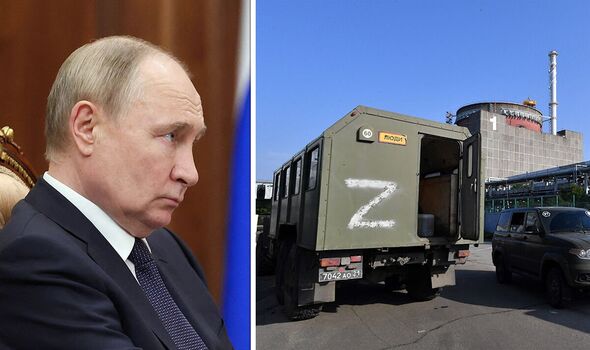All seven safety criteria at Ukraine’s battered Zaporizhzhia Nuclear Power Plant have been either fully or partially compromised, the Director General of the International Atomic Energy Association (IAEA) has warned, saying the situation was both “grave” and “precarious”.
Rafael Grossi also revealed problems accessing large areas of the site, in the south of the country, meant it was difficult to say whether the facility as a whole was safe.
He told the nuclear watchdog’s Board of Governors the IAEA continued to monitor, assess, and communicate the impact of the war in Ukraine on the safety and security of Ukraine’s nuclear facilities.
Mr Grossi stressed: “The situation at the Zaporizhzhia Nuclear Power Plant remains precarious.
“All seven pillars of nuclear safety and security have been fully or partially compromised.
In early April, the Zaporizhzhia NPP had suffered direct attacks for the first time in nearly 18 months, Mr Grossi explained.
He continued: “These attacks violated the first of the five concrete principles for protecting the Zaporizhzhia NPP that I laid out to the Board for the first time one year ago.
“The attacks and the frequent disconnection of the off-site power lines due to military activity are creating a grave situation, which I described to the United Nations Security Council on April 25, in my seventh such briefing of the body.
“Issues related to staffing, routine inspection and maintenance of the safety structures, systems, and components; reliability of supply chains as well as on-site emergency arrangements continue to be challenging and to present risks to the nuclear safety and security of the plant.”
On May 28, Mr Grossi travelled to Kaliningrad and raised with Alexey Likhachev, head of Russian state nuclear company Rosatom, factors which he believes “remain a challenge for nuclear safety”.
He said: “Since April, all six reactor units are in cold shutdown. This had been recommended by the Agency for some time, as it enhances the overall safety of the facility.
“The IAEA Support and Assistance Mission to Zaporizhzhia (ISAMZ) does not receive access to some areas of significance to nuclear safety and security of the Zaporizhzhia NPP site, and to have open discussions with all relevant staff.
“This challenges the Agency in making impartial and steadfast assessments of the situation against the Seven Pillars and limits our ability to continuously provide a clear confirmation that the five concrete principles are being kept.”
Nor was it only Zaporizhzhia which was a worry, Mr Grossi pointed out.
He said: “Elsewhere across Ukraine, the IAEA maintained its continued presence at Ukraine’s four other nuclear power plants. IAEA teams continue to report compromised supply chains for spare parts and high levels of stress among the plants’ staff.
“Since the last meeting of the Board, all rotations of Agency staff at all nuclear sites in Ukraine were conducted as planned and without delays. A total of 24 missions comprising 45 Agency staff members were deployed.
Since the start of the war, 47 deliveries of equipment worth more than €9.4 million have reached 18 organisations in Ukraine.
“The Agency continued delivery of its medical assistance programme as well as its work to define Ukraine’s needs arising from the flooding in the Kherson Oblast. In addition, we prepared a proposal for the first phase of the Agency’s support on safety and security of radioactive sources in Ukraine.
The report on Nuclear Safety, Security and Safeguards in Ukraine is before the Board.”
